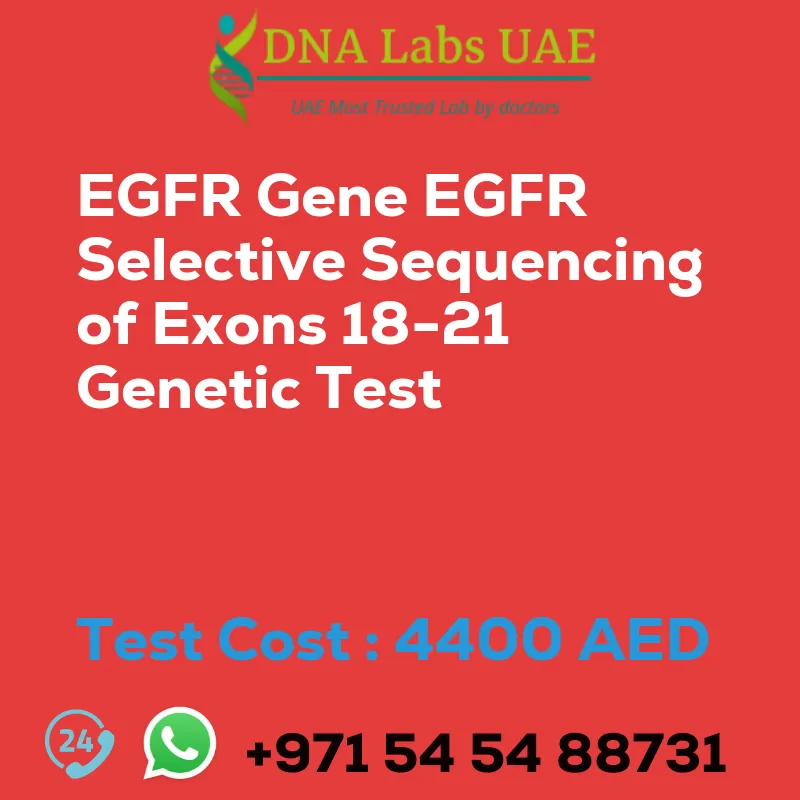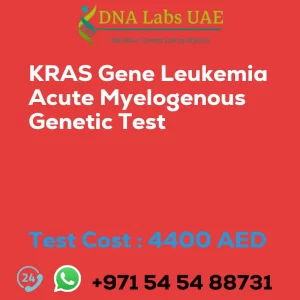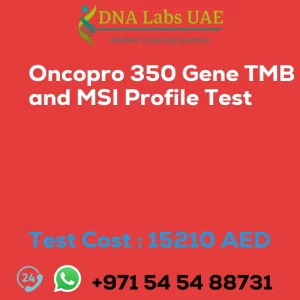EGFR Gene EGFR selective sequencing of exons 18-21 Genetic Test
Welcome to DNA Labs UAE, a leading genetic laboratory specializing in genetic testing. In this blog post, we will be discussing the EGFR gene and the selective sequencing of exons 18-21 genetic test.
Test Name: EGFR Gene EGFR selective sequencing of exons 18-21 Genetic Test
Test Components:
- Price: 4400.0 AED
- Sample Condition: Blood or Extracted DNA or One drop Blood on FTA Card
- Report Delivery: 3 to 4 Weeks
- Method: NGS Technology
- Test Type: Cancer
- Doctor: Oncologist
- Test Department: Genetics
Pre Test Information:
Clinical History of Patient who is going for EGFR Gene EGFR selective sequencing of exons 18-21 NGS Genetic DNA Test. A Genetic Counselling session to draw a pedigree chart of family members affected with EGFR Gene EGFR, selective sequencing of exons 18-21 NGS Genetic DNA Test gene EGFR.
Test Details:
The EGFR gene (Epidermal Growth Factor Receptor gene) is a gene that encodes a receptor protein involved in cell growth and division. Mutations in the EGFR gene have been found to be associated with various types of cancer, including lung cancer.
Selective sequencing of exons 18-21 of the EGFR gene is a type of genetic test that focuses on sequencing specific regions of the gene. Exons are the coding regions of a gene, and exons 18-21 of the EGFR gene contain important regions that are commonly mutated in cancer.
Next-generation sequencing (NGS) is a high-throughput sequencing technology that allows for the simultaneous sequencing of multiple regions of a gene or multiple genes. NGS technology has revolutionized genetic testing by enabling faster and more cost-effective sequencing compared to traditional Sanger sequencing methods.
The selective sequencing of exons 18-21 of the EGFR gene using NGS allows for the identification of specific mutations or variants in these regions. This information can be used to guide personalized treatment decisions, especially in the case of lung cancer, where EGFR mutations are known to influence the response to certain targeted therapies, such as EGFR tyrosine kinase inhibitors.
In summary, the EGFR gene is an important gene associated with cancer, and selective sequencing of exons 18-21 using NGS is a genetic test that focuses on identifying mutations in these specific regions. This test can provide valuable information for personalized treatment decisions in cancer patients.
| Test Name | EGFR Gene EGFR selective sequencing of exons 18-21 Genetic Test |
|---|---|
| Components | |
| Price | 4400.0 AED |
| Sample Condition | Blood or Extracted DNA or One drop Blood on FTA Card |
| Report Delivery | 3 to 4 Weeks |
| Method | NGS Technology |
| Test type | Cancer |
| Doctor | Oncologist |
| Test Department: | Genetics |
| Pre Test Information | Clinical History of Patient who is going for EGFR Gene EGFR, selective sequencing of exons 18-21 NGS Genetic DNA Test. A Genetic Counselling session to draw a pedigree chart of family members affected with EGFR Gene EGFR, selective sequencing of exons 18-21 NGS Genetic DNA Test gene EGFR |
| Test Details |
The EGFR gene (Epidermal Growth Factor Receptor gene) is a gene that encodes a receptor protein involved in cell growth and division. Mutations in the EGFR gene have been found to be associated with various types of cancer, including lung cancer. Selective sequencing of exons 18-21 of the EGFR gene is a type of genetic test that focuses on sequencing specific regions of the gene. Exons are the coding regions of a gene, and exons 18-21 of the EGFR gene contain important regions that are commonly mutated in cancer. Next-generation sequencing (NGS) is a high-throughput sequencing technology that allows for the simultaneous sequencing of multiple regions of a gene or multiple genes. NGS technology has revolutionized genetic testing by enabling faster and more cost-effective sequencing compared to traditional Sanger sequencing methods. The selective sequencing of exons 18-21 of the EGFR gene using NGS allows for the identification of specific mutations or variants in these regions. This information can be used to guide personalized treatment decisions, especially in the case of lung cancer, where EGFR mutations are known to influence the response to certain targeted therapies, such as EGFR tyrosine kinase inhibitors. In summary, the EGFR gene is an important gene associated with cancer, and selective sequencing of exons 18-21 using NGS is a genetic test that focuses on identifying mutations in these specific regions. This test can provide valuable information for personalized treatment decisions in cancer patients. |








